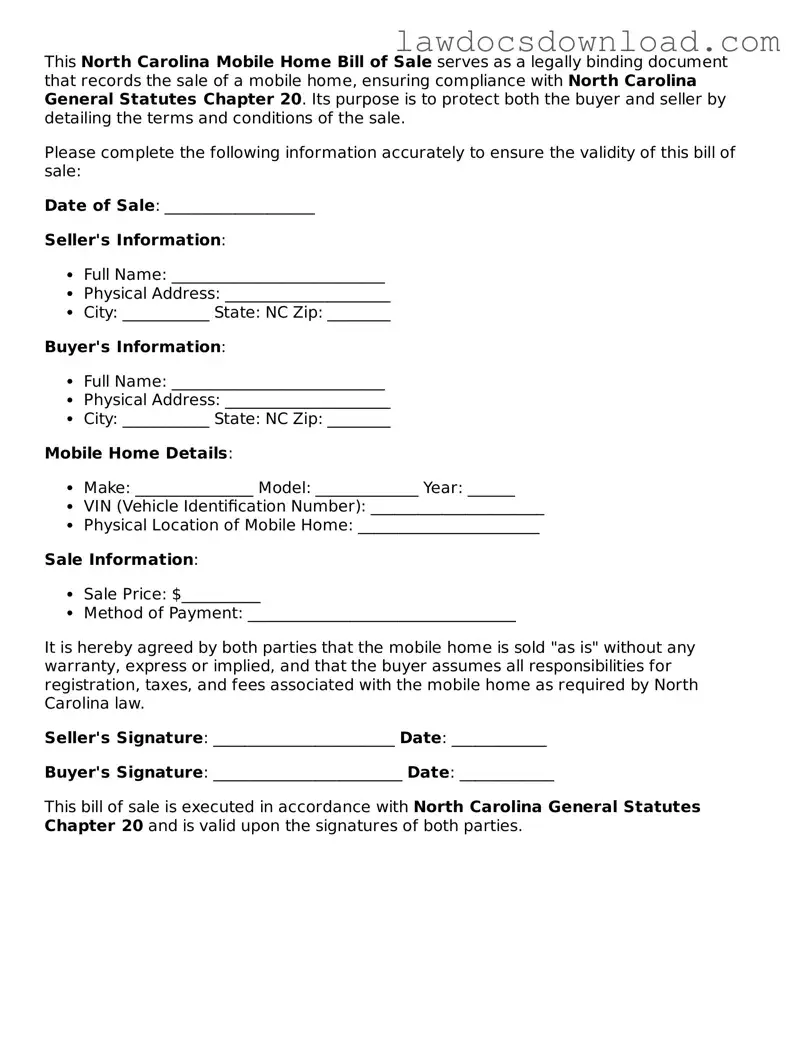The North Carolina Mobile Home Bill of Sale form shares similarities with the Vehicle Bill of Sale form, as both serve as pivotal proofs of purchase for high-value assets. Each document contains details about the seller and the buyer, the sale date, and specifics about the asset being sold, including identification numbers and the sale price. They both function as legally binding agreements that transfer ownership from the seller to the buyer, making them essential for registration and taxation purposes.
Comparable to the Real Estate Sales Agreement, the Mobile Home Bill of Sale is integral in transactions involving significant property. While the Real Estate Sales Agreement deals with stationary properties and includes more detailed terms and conditions of the sale, the Mobile Home Bill of Sale focuses specifically on mobile homes. However, they both establish the terms under which the property is sold, including the agreed-upon price, and they layout the responsibilities of each party.
Similarly, the Boat Bill of Sale is akin to the Mobile Home Bill of Sale, as it is used when transferring ownership of a boat. Both documents necessitate detailed descriptions of the item being sold, including make, model, year, and identification numbers. These forms act as receipts for the transaction and are required for the registration of the item under the new owner's name at the appropriate state department.
The General Bill of Sale form is another document with resemblances to the Mobile Home Bill of Sale, designed for the sale of personal property items, such as electronics, furniture, or equipment. While it's more generic and can be used for a variety of items, like the Mobile Home Bill of Sale, it records the transaction details, including the parties' information, sale date, and purchase price, thus serving a similar legal purpose of documenting the change of ownership.
The Firearm Bill of Sale shares the purpose of documenting the sale and transfer of ownership, similar to the Mobile Home Bill of Sale. Specific to firearms, it includes critical details about the item sold, such as make, model, and serial number, alongside buyer and seller details. Both forms provide a legal proof of sale and are important for the buyer's registration purposes.
Like the Mobile Home Bill of Sale, the Equipment Bill of Sale is used in transactions involving specific items, in this case, heavy or substantial equipment. This document details the equipment's description, the sale amount, and the identities of the buyer and seller, ensuring a legal transfer of ownership. Though focused on different types of property, both forms facilitate similar transactions and legal documentation needs.
An Aircraft Bill of Sale also parallels the Mobile Home Bill of Sale by serving a similar purpose in the niche of aircraft sales. It details the sale of an aircraft by including pertinent information such as the make, model, and serial number, alongside the sale conditions. Both documents are crucial for recording the transaction, providing proof of ownership, and are essential for the registration process.
The Business Bill of Sale form shares common ground with the Mobile Home Bill of Sale in transactions involving the sale of assets. In the case of the Business Bill of Sale, it's the sale of a business, including its assets, inventory, and operations. Both forms document the transaction's details, record the sale price, and transfer ownership from one party to another, playing a key role in the transition process.
Lastly, the Pet Bill of Sale is similar to the Mobile Home Bill of Sale as it documents the sale and transfer of ownership, but for pets. It includes specific details about the pet, such as breed, date of birth, and health information, along with the sale conditions. Both forms ensure the legal transfer of property, in their respective categories, from the seller to the buyer, providing a clear record of the transaction.

